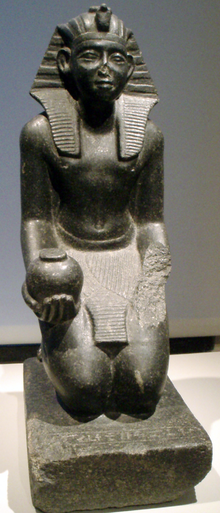Khahotepre Sobekhotep VI
| Khahotepre Sobekhotep VI | |||||||||||||||||||||||||||||||||||||||||||||||||||||||
|---|---|---|---|---|---|---|---|---|---|---|---|---|---|---|---|---|---|---|---|---|---|---|---|---|---|---|---|---|---|---|---|---|---|---|---|---|---|---|---|---|---|---|---|---|---|---|---|---|---|---|---|---|---|---|---|
 Kneeling statue of Khahotepre Sobekhotep VI, on display at the Altes Museum, Berlin | |||||||||||||||||||||||||||||||||||||||||||||||||||||||
| Pharaoh | |||||||||||||||||||||||||||||||||||||||||||||||||||||||
| Reign | 4 years, 8 months and 29 days, 1719-1715 BC[1] | ||||||||||||||||||||||||||||||||||||||||||||||||||||||
| Predecessor | Sobekhotep V | ||||||||||||||||||||||||||||||||||||||||||||||||||||||
| Successor | Wahibre Ibiau | ||||||||||||||||||||||||||||||||||||||||||||||||||||||
| |||||||||||||||||||||||||||||||||||||||||||||||||||||||
| Consort | Nubhotepti ? Khaenoub ? | ||||||||||||||||||||||||||||||||||||||||||||||||||||||
| Father | Sobekhotep IV ? | ||||||||||||||||||||||||||||||||||||||||||||||||||||||
| Mother | Tjan ? | ||||||||||||||||||||||||||||||||||||||||||||||||||||||
| Dynasty | 13th Dynasty | ||||||||||||||||||||||||||||||||||||||||||||||||||||||
Khahotepre Sobekhotep VI (also known as Sobekhotep V) was an Egyptian king of the late 13th Dynasty during the Second Intermediate Period.
Family
[edit]Khahotepre Sobekhotep VI's father was perhaps Sobekhotep IV, the best attested king of the entire second intermediate period. This hypothesis is based on an inscription found in the Wadi el-Hudi which attests that Sobekhotep IV had a son called 'Sobekhotep'. If this son is indeed Sobekhotep VI, then his mother would be possibly Tjan, wife of Sobekhotep IV. Sobekhotep VI's queen may have been named Khaenoub (also Khaesnebou) or Nubhotepti.[2]
Attestations
[edit]
Khahotepre Sobekhotep may have had four regnal years. Only a few objects attest to his reign. There exists a scarab seal from Abydos[3] and a kneeling statuette of the king, possibly from Kerma.
At Abydos, a fragmentary funerary stela dedicated to the god Wepwawet mentions [Kha]hotepre.[4][5] The stela has also been assigned to Merhotepre Ini.
At Elephantine, a kneeling statue with a dedication to Satis, Lady of Elephantine, found at Kerma Tumulus X.[6]
In Jericho, a scarab bearing the prenomen Khahotepre was found in a tomb associated with pottery Group III (MB IIB/C). It could be evidence of trade relations between the 13th dynasty state and the Levant.[2]
Items of unknown provenance include 6 scarab seals, a cylinder seal[7] and a seal impression.[8]
Non-Contemporary Attestations
[edit]The Karnak King List #41 dating to Thutmoses III mentions his prenomen Khahotepre.
The Turin canon 8:01 dating to Ramesses II mentions Khahotepre, credited with a reign of 4 years, 8 months and 29 days,[9] He is considered a successor of Sobekhotep IV. However, one line is missing (lacuna) just below the line of Sobekhotep IV. Ryholt speculates that this line would preserve the name of Merhotepre Sobekhotep.[10]
Theories
[edit]According to Egyptologist Kim Ryholt he was the thirty-first pharaoh of the dynasty, while Darrell Baker believes instead that he was its thirtieth ruler.[1][2] Alternatively, Jürgen von Beckerath and Detlef Franke see him as the twenty-fifth king of the dynasty.[11][12][13]
Ryholt dates Sobekhotep VI to 1719-1715 BC.[1]
Identity
[edit]Until Ryholt's study of the Second Intermediate Period, it was believed that Sobekhotep VI's prenomen was Merhotepre. Reevaluating the archeological evidence, however, Ryholt attributed Merhotepre to Sobekhotep V and Khahotepre to Sobekhotep VI. Because of this change of prenomen, Merhotepre Sobekhotep and Khahotepre Sobekhotep are respectively called Sobekhotep VI and Sobekhotep V in older studies.[1][2]
References
[edit]- ^ a b c d K. S. B. Ryholt, The political situation in Egypt during the second intermediate period, c. 1800–1550 B.C. Museum Tusculanum Press, 1997, pp 37, 233
- ^ a b c d Darrell D. Baker: The Encyclopedia of the Pharaohs: Volume I - Predynastic to the Twentieth Dynasty 3300–1069 BC, Stacey International, ISBN 978-1-905299-37-9, 2008
- ^ Scarab of Khahotepre Sobekhotep, Metropolitan Museum of Art
- ^ Now at Grand Egyptian Museum (GEM); CG 20044 (JE 27578)
- ^ Ahmed M Osman () Unpublished Round Topped Stela of King “Sobekhotep VI”, [1]https://mkaq.journals.ekb.eg/article_212430_ea7a91d774e833f264de765b13ca7535.pdf
- ^ Berlin 10645 + BMFA 13.3985; Ryholt 1997:353 File 13/31
- ^ Cylinder seal of Sobekhotep VI, Petrie Museum UC 11580
- ^ Petrie Museum UC 11570
- ^ Thomas Schneider: Lexikon der Pharaonen, p. 257
- ^ Ryholt, pp.22-23
- ^ Jürgen von Beckerath: Untersuchungen zur politischen Geschichte der Zweiten Zwischenzeit in Ägypten, Glückstadt, 1964
- ^ Jürgen von Beckerath: Chronologie des pharaonischen Ägyptens, Münchner Ägyptologische Studien 46, Mainz am Rhein, 1997
- ^ Thomas Schneider: Ancient Egyptian Chronology - Edited by Erik Hornung, Rolf Krauss, And David a. Warburton, available online, see p. 176
External links
[edit]- Sobekhotep VI from Digital Egypt (University College. London)
